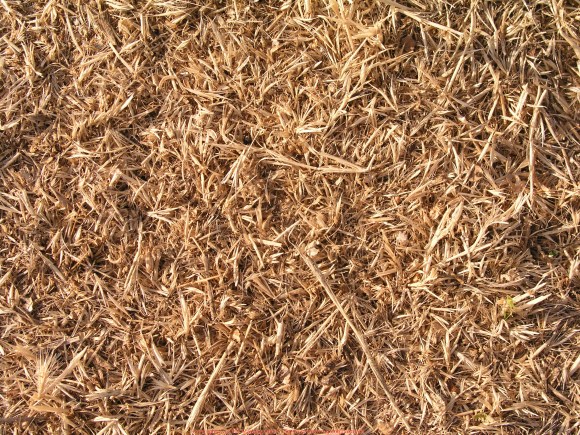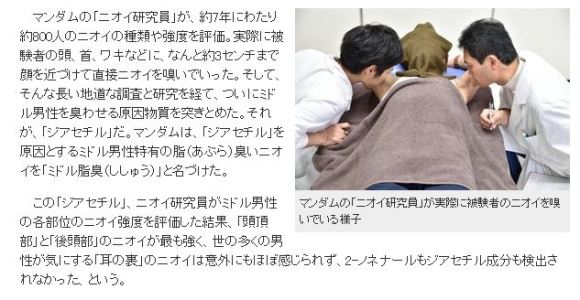
What do you dread the most about growing old? Is it the aching muscles after what used to be an easy exercise routine? The need to get up and pee multiple times during the night? Or how about that distinctive “old-person smell” that sneaks into the air whenever a senior citizen is around?
Speaking of that last one, have you ever wondered where that particular odor comes from? Although many people believe that the source of the smell is behind the ears, a team of Japanese researchers have recently disproved this theory after what must have been an excruciatingly odoriferous ordeal. You might want to plug your nose for this one, folks–things are about to smell more than a little fishy around here…
As someone who works mostly with children and teenagers, I’ve never really been in a situation where I had to endure the so-called “old-person smell” for long periods of time. But the following tweets illustrate just how finely attuned others are to the unique smell:
▼”I sat down too quickly and was overcome by the smell of the old man sitting next to me (×_×)”
https://twitter.com/07subaru/status/545738823863255040▼”The destructive power of the old-man smell shouldn’t be taken lightly (-_-)”
https://twitter.com/youkohako/status/545771055952846849▼”A women who looked to be in her late 20s/early 30s was sitting next to me, but she smelled awful–about three times as bad as the younger guy over there. What’s up with that?”
見た目20後半から30後半の女性が隣に座ってるのだけど加齢臭がやばい。そこらへんのおじいちゃんの3倍くらいなのだが…どうしたの
— 黒胡椒 (@burapetinoo) December 13, 2014
In fact, Japan’s My Navi News recently surveyed 200 of its readers about unpleasant odors. A whopping 40.9% responded that the old-person smell bothered them the most–even more than the smell of sweat or the smell of cigarettes (both ranked in at 14.6%).
So what exactly causes this bothersome scent?
Japanese scientists have recently classified naturally occurring body odors into three main types: smells caused by sweat, smells caused by the chemical compound 2-nonenal (also known as the old-person smell, or 加齢臭 in Japanese), and smells caused by the chemical compound diacetyl (which gives middle-aged folk their own unique smell; the newly coined termed in Japanese is ミドル脂臭 / midoru shishuu). This last category is the result of new research and distinguishes between the body odors of middle-aged people and the elderly.
Let’s now take a look at each of the three categories.
First of all, 2-nonenal is responsible for the distinctive smell of elderly people. Although many people (at least within Japan) mistakenly believe that the odor emanates from behind a person’s ears, it actually comes from the back and central chest areas. If you smell something fishy behind the ears, it’s probably just the smell of perspiration, which occurs when odorless sweat rises to the surface of the skin and mixes with sebum and bacteria.
In addition to those two sources of body odor, Japanese researchers have just concluded that a third type of oily odor is present in middle-aged people due to the presence of a chemical compound called diacetyl. Diacetyl reaches its peak of production when people are in their late 30s or 40s, which is why it gained the nicknamed “the middle-aged person smell.” The chemical is said to be very volatile, and is over 100 times more easily diffused in an enclosed area than is nonenal. Articles have likened this third kind of smell to an old dresser or dead grass, also stating that women may be more sensitive to the smell than men.
▼We assume that “dead grass” means this kind of grass, and not the freshly mowed variety that seems to rank high on people’s lists of most pleasant smells.
These discoveries about the middle-aged person smell came to light following the conclusion of a research study conducted by the Mandom Corporation (a Japanese manufacturer of hair care, skin care, perfumes, and deodorants), which lasted over seven years and involved approximately 800 middle-aged participants. In the study, researchers got up close (only three centimeters away!) to the participants’ heads, necks, and armpits, and took in big whiffs of body odor to try to pinpoint the source of the particular smell. Impressively, they were able to determine that the smell was strongest at the top and back of the head.
▼Don’t quit your day job, guys…err, wait, this is your day job…
Of course, people’s bodily scents can also vary depending on their individual diets and lifestyle choices. One Japanese source provides a list of tips for those self-conscious readers who wish to decrease their unpleasant natural scents:
- For protein, eat more fish than meat, and even more soy products than fish.
- Get plenty of antioxidants by eating dark-colored vegetables, sesame seeds, nuts, and citrus fruits.
- Eat more brown rice.
- Try to get at least six hours of sleep. If you don’t get enough sleep, your sebaceous glands will go into overdrive and production of the chemical 2-nonenal will increase.
We hope you’ve enjoyed this brief look at some of the science behind body odor. I’ve certainly gained an increased appreciation for the researchers who–quite literally–stick their noses into unwelcome places in the name of science!
Source: Naver Matome
Top image: Seesaa Blog
Insert images: Mayang’s Textures, Diamond Online



 Does this “Mother Milk” eau de toilette really smell like a newborn baby? We ask a baby
Does this “Mother Milk” eau de toilette really smell like a newborn baby? We ask a baby Why is it so hard to find hot sake in convenience stores in Japan?
Why is it so hard to find hot sake in convenience stores in Japan? Mystery stink haunts Kanagawa Prefecture, worries seismologist
Mystery stink haunts Kanagawa Prefecture, worries seismologist Young woman-scent body soap and deodorant becomes a hit with lonely Japanese dudes
Young woman-scent body soap and deodorant becomes a hit with lonely Japanese dudes Sayonara, smelly salarymen! Japanese company develops self-smell-checking device
Sayonara, smelly salarymen! Japanese company develops self-smell-checking device Foreigner’s request for help in Tokyo makes us sad for the state of society
Foreigner’s request for help in Tokyo makes us sad for the state of society Japanese city loses residents’ personal data, which was on paper being transported on a windy day
Japanese city loses residents’ personal data, which was on paper being transported on a windy day Akihabara pop-up shop sells goods made by Japanese prison inmates
Akihabara pop-up shop sells goods made by Japanese prison inmates Ghibli Park now selling “Grilled Frogs” from food cart in Valley of Witches
Ghibli Park now selling “Grilled Frogs” from food cart in Valley of Witches Red light district sushi restaurant in Tokyo shows us just how wrong we were about it
Red light district sushi restaurant in Tokyo shows us just how wrong we were about it Tokyo Tsukiji fish market site to be redeveloped with 50,000-seat stadium, hotel, shopping center
Tokyo Tsukiji fish market site to be redeveloped with 50,000-seat stadium, hotel, shopping center Limited-edition Carbonara Udon will anger noodle purists and pasta lovers 【Taste test】
Limited-edition Carbonara Udon will anger noodle purists and pasta lovers 【Taste test】 Beautiful Red and Blue Star luxury trains set to be Japan’s new Hokkaido travel stars
Beautiful Red and Blue Star luxury trains set to be Japan’s new Hokkaido travel stars Cappuccino Ramen becomes super popular in Japan, but is it worth the hype?
Cappuccino Ramen becomes super popular in Japan, but is it worth the hype? Major Japanese restaurant chain introducing bamboo straws to help reduce plastic and save forests
Major Japanese restaurant chain introducing bamboo straws to help reduce plastic and save forests McDonald’s new Happy Meals offer up cute and practical Sanrio lifestyle goods
McDonald’s new Happy Meals offer up cute and practical Sanrio lifestyle goods Japanese ramen restaurants under pressure from new yen banknotes
Japanese ramen restaurants under pressure from new yen banknotes French Fries Bread in Tokyo’s Shibuya becomes a hit on social media
French Fries Bread in Tokyo’s Shibuya becomes a hit on social media Studio Ghibli releases new action figures featuring Nausicaä of the Valley of the Wind characters
Studio Ghibli releases new action figures featuring Nausicaä of the Valley of the Wind characters New private rooms on Tokaido Shinkansen change the way we travel from Tokyo to Kyoto
New private rooms on Tokaido Shinkansen change the way we travel from Tokyo to Kyoto All-you-can-drink Starbucks and amazing views part of Tokyo’s new 170 meter-high sky lounge
All-you-can-drink Starbucks and amazing views part of Tokyo’s new 170 meter-high sky lounge Beautiful Ghibli sealing wax kits let you create accessories and elegant letter decorations【Pics】
Beautiful Ghibli sealing wax kits let you create accessories and elegant letter decorations【Pics】 Studio Ghibli releases Kiki’s Delivery Service chocolate cake pouches in Japan
Studio Ghibli releases Kiki’s Delivery Service chocolate cake pouches in Japan New definition of “Japanese whiskey” goes into effect to prevent fakes from fooling overseas buyers
New definition of “Japanese whiskey” goes into effect to prevent fakes from fooling overseas buyers Our Japanese reporter visits Costco in the U.S., finds super American and very Japanese things
Our Japanese reporter visits Costco in the U.S., finds super American and very Japanese things Studio Ghibli unveils Mother’s Day gift set that captures the love in My Neighbour Totoro
Studio Ghibli unveils Mother’s Day gift set that captures the love in My Neighbour Totoro More foreign tourists than ever before in history visited Japan last month
More foreign tourists than ever before in history visited Japan last month New Pokémon cakes let you eat your way through Pikachu and all the Eevee evolutions
New Pokémon cakes let you eat your way through Pikachu and all the Eevee evolutions Sales of Japan’s most convenient train ticket/shopping payment cards suspended indefinitely
Sales of Japan’s most convenient train ticket/shopping payment cards suspended indefinitely Sold-out Studio Ghibli desktop humidifiers are back so Totoro can help you through the dry season
Sold-out Studio Ghibli desktop humidifiers are back so Totoro can help you through the dry season Japanese government to make first change to romanization spelling rules since the 1950s
Japanese government to make first change to romanization spelling rules since the 1950s Ghibli founders Toshio Suzuki and Hayao Miyazaki contribute to Japanese whisky Totoro label design
Ghibli founders Toshio Suzuki and Hayao Miyazaki contribute to Japanese whisky Totoro label design Doraemon found buried at sea as scene from 1993 anime becomes real life【Photos】
Doraemon found buried at sea as scene from 1993 anime becomes real life【Photos】 Tokyo’s most famous Starbucks is closed
Tokyo’s most famous Starbucks is closed One Piece characters’ nationalities revealed, but fans have mixed opinions
One Piece characters’ nationalities revealed, but fans have mixed opinions We asked a Uniqlo employee what four things we should buy and their suggestions didn’t disappoint
We asked a Uniqlo employee what four things we should buy and their suggestions didn’t disappoint Princesses, fruits, and blacksmiths: Study reveals the 30 most unusual family names in Japan
Princesses, fruits, and blacksmiths: Study reveals the 30 most unusual family names in Japan Japanese deodorant sheets for ladies smell so nice some guys don’t need the actual girl
Japanese deodorant sheets for ladies smell so nice some guys don’t need the actual girl Seven unbelievable jobs that actually exist in Japan
Seven unbelievable jobs that actually exist in Japan Japanese TV reveals the revolting truth about the source of jasmine’s alluring fragrance
Japanese TV reveals the revolting truth about the source of jasmine’s alluring fragrance Smell like matcha tiramisu with new spray lotion from 126-year-old Japanese cosmetics company
Smell like matcha tiramisu with new spray lotion from 126-year-old Japanese cosmetics company We try out the R-rated “world’s smelliest burger” from a Tokyo burger cafe
We try out the R-rated “world’s smelliest burger” from a Tokyo burger cafe Bar explodes in Tokyo’s Shinbashi neighborhood【Videos】
Bar explodes in Tokyo’s Shinbashi neighborhood【Videos】 T-virus perfume to go on sale at the Capcom Café — certified fresh by Umbrella Corp.
T-virus perfume to go on sale at the Capcom Café — certified fresh by Umbrella Corp. Japanese woman asks for advice on how to deal with smell of son’s corpse, gets arrested
Japanese woman asks for advice on how to deal with smell of son’s corpse, gets arrested 72 percent of foreigners in survey say they’ve been disappointed by bad breath in Japan
72 percent of foreigners in survey say they’ve been disappointed by bad breath in Japan Girls spotted crying in Tokyo’s Shibuya neighborhood for a startling, invisible reason
Girls spotted crying in Tokyo’s Shibuya neighborhood for a startling, invisible reason Japanese graves and Shinto shrines under attack by bears for their sweet, sweet honey
Japanese graves and Shinto shrines under attack by bears for their sweet, sweet honey Japanese teens develop anti-fart underwear that blocks smell and sound of flatulence
Japanese teens develop anti-fart underwear that blocks smell and sound of flatulence Stinky armpit smells transform into handsome anime men in hopes of making Japan smell better
Stinky armpit smells transform into handsome anime men in hopes of making Japan smell better Fate/stay night and Axe body spray partner up in attempt to make anime fans smell nice
Fate/stay night and Axe body spray partner up in attempt to make anime fans smell nice Wasabi found to promote hair growth 3 times faster than minoxidil
Wasabi found to promote hair growth 3 times faster than minoxidil We try the new, limited edition squid viscera potato chips from Japan【Taste Test】
We try the new, limited edition squid viscera potato chips from Japan【Taste Test】
Leave a Reply